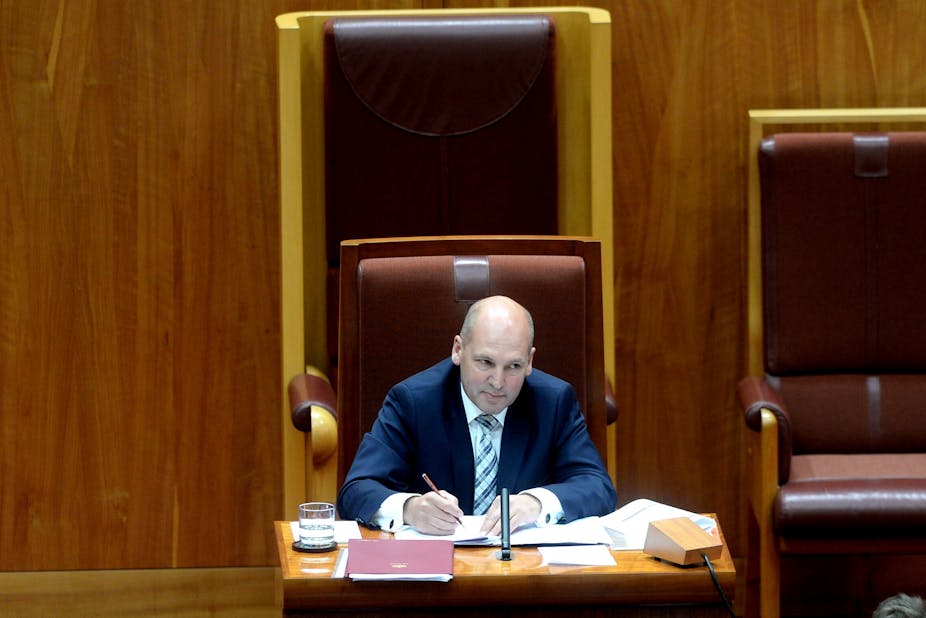Update: Tony Abbott is effectively overruling Speaker Bronwyn Bishop and Senate president Stephen Parry’s decree that would see Muslim women with facial coverings confined to glass boxes when they observed parliamentary proceedings.
Concerned at the widespread backlash to the decision Abbott will ask the presiding officers to rethink it. While it will be couched as a request - the presiding officers have authority over arrangements for the Parliament - they effectively have little option but to comply.
Earlier: Women with facial coverings will be in glass enclosures if they sit in on parliamentary proceedings, under changes approved by the Speaker of the House of Representatives and the Senate President.
The decree, which immediately sparked protests, is part of a continuing Parliament House security crackdown.
Most members of the public observing Parliament are seated in open galleries. The closed galleries are used for groups of school children.
Senate president Stephen Parry said people needed to be able to be identified if they caused an incident or interjected.
“They need to be identified quickly and easily so they can be removed … and we need to know who that person is so they cannot return to the gallery, disguised or otherwise.”
Human Rights Commissioner Tim Wilson, who was appointed by the Abbott government to promote a freedom agenda, tweeted that there was “no justification for undermining religious freedom” when people had gone through security checkpoints.
Wilson told Sky the change was based on “a non-problem”. He said in the NSW parliament people with a religious cover were separately identified by a female officer and could then go about their business. Deciding what to wear was its own form of free speech, he said.
Race Discrimination Commissioner Tim Soutphommasane tweeted that “no one should be treated like a second-class citizen, not least in their own parliament”.
Earlier he told the Australian Catholic Bishops conference that the suggestion that the burqa represented a threat to safety in parliament was odd. People had to pass through a metal detector. If there was a need for identification of someone wearing a burka or niqab, security could check this “without too much drama”.
A coercive ban “may have the reverse effect to that intended. It may simply increase cultural tensions and social distrust. It may provide fuel for extremist propaganda and assist extremists in recruiting disillusioned young Australians to their cause”.
Greens leader Christine Milne said on Twitter: “Just found out Muslim women wearing facial coverings are to be relegated to part of parliament reserved for rowdy school kids. Disgraceful”.
Independent Andrew Wilkie said the segregation was “religious apartheid”.
But conservative Liberal senator Cory Bernardi, who has been urging a ban on the burka in Parliament House, said this was an interim step by the presiding officers and a very prudent one. He said he had seen a group of six people some years ago with their faces covered, which had started his concern about the issue, and he had later been told by officials that someone could come into the building wearing a balaclava.
Social Services Minister Kevin Andrews stirred the burqa debate today when he described the garment as “rather medieval” and demeaning to women.
A circular from the Department of Parliamentary Services said the presiding officers had sought advice from security agencies about screening policies relating to identity coverings.
“Whilst these policies are under review and given the large numbers of visitors to Parliament House, it is prudent to implement an additional layer of security controls,” the circular said.
It said that putting those with facial coverings in the enclosed galleries would ensure these people “can continue to enter the chamber galleries, without needing to be identifiable”.
From now on photographic identification will be required for the issuing of escorted passes for all adults visitors to the non-public areas of Parliament House. Security officers would manage “any cultural or religious issues relating to this in a sensitive and appropriate manner”. Many outsiders visit these areas, especially when Parliament is sitting, to see politicians or their staff. Unescorted passes to these areas have already been banned.
The circular said the measures were designed to enhance existing security arrangements. “Please be assured that Parliament House remains open for business.”

